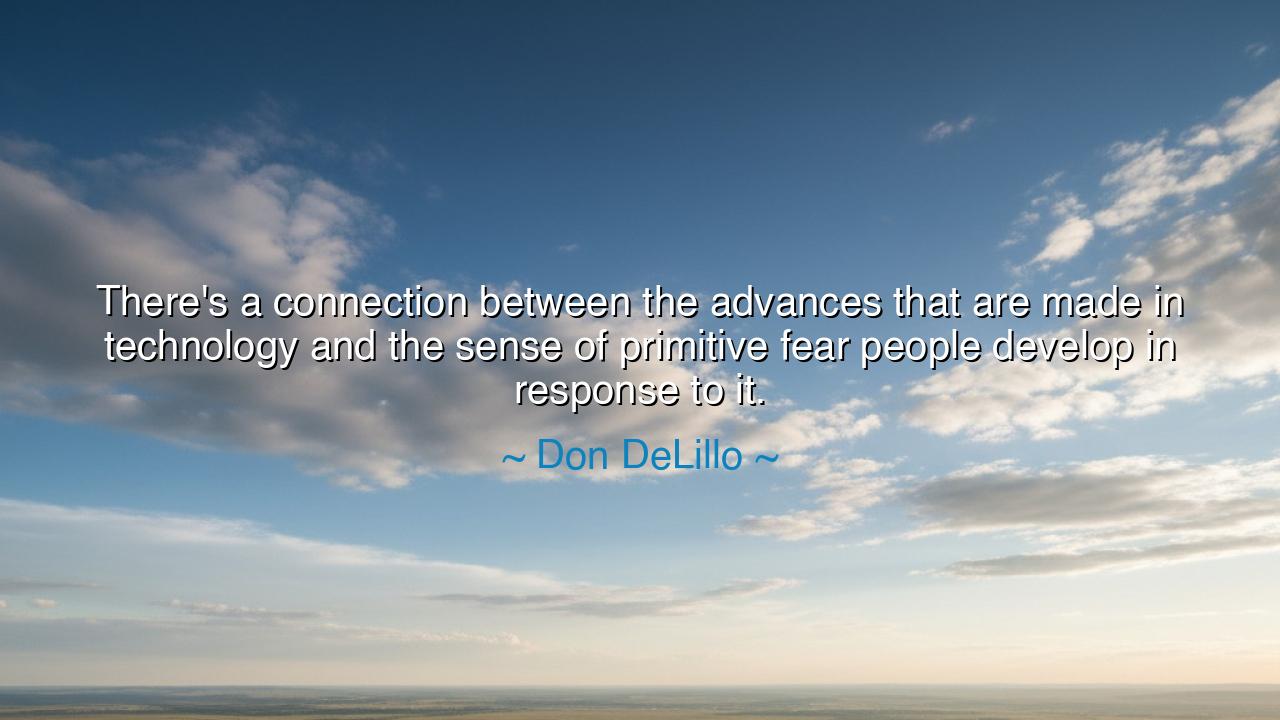
There's a connection between the advances that are made in
There's a connection between the advances that are made in technology and the sense of primitive fear people develop in response to it.






The novelist and observer of modern unease, Don DeLillo, once proclaimed: “There's a connection between the advances that are made in technology and the sense of primitive fear people develop in response to it.” In this paradoxical truth, he unveils a hidden law of human history: that each step of technological progress, while meant to liberate, also awakens a deep and ancient fear within the soul. For the same inventions that expand our reach also remind us of our fragility, our smallness before the forces we ourselves unleash.
This fear is called primitive because it reaches back to the earliest stirrings of mankind. When fire was first tamed, it gave warmth, protection, and power — yet it also evoked awe and dread, for a single spark could destroy an entire village. When the wheel was invented, it brought mobility, but also the terror of speed and crushing weight. Each leap forward has carried with it not only celebration, but an echo of trembling, as if the soul knew that power, once gained, cannot easily be restrained.
Consider the dawn of the Industrial Revolution. The sight of great machines churning with iron teeth filled workers with both wonder and dread. Factories multiplied wealth, yet they also consumed lives, filling lungs with soot and shattering communities with endless labor. The rise of these machines stirred a primitive fear — the fear of being replaced, diminished, or destroyed by the very creations of human hands. This fear birthed resistance movements, such as the Luddites, who smashed the machines not out of ignorance, but out of a terror that progress was devouring humanity.
This pattern continued in the 20th century with the birth of nuclear technology. The atom, once invisible and intangible, was split, releasing both limitless energy and unprecedented destruction. Cities lit with nuclear power gleamed like jewels of progress, yet shadows of Hiroshima and Nagasaki fell across the world, filling hearts with dread. The fear that arose was not simply rational but primal — the terror that humanity had harnessed forces too vast to control, powers capable of extinguishing life itself.
DeLillo’s words also point toward the age we now inhabit, where digital technology reshapes the very fabric of existence. The internet connects billions, artificial intelligence mimics the mind, and biotechnology alters the code of life itself. These marvels astonish, yet they also awaken ancient fears: fear of surveillance, fear of irrelevance, fear of being overtaken by machines that know us better than we know ourselves. The more powerful the tools, the deeper the unease, for progress always casts a shadow.
The lesson here is not to reject technology, but to recognize the shadow it carries. Fear is not an enemy but a teacher — it reminds us to approach our creations with humility, caution, and ethical foresight. The primitive fear DeLillo describes is the soul’s alarm, a warning that power without wisdom is peril. We must not allow fear to paralyze us, nor must we allow fascination to blind us. Instead, we must walk the middle path: embracing progress while tempering it with responsibility.
Therefore, O children of tomorrow, remember DeLillo’s warning: every leap in technology will awaken both wonder and dread. Do not scorn the fear, for it is the echo of your ancestors reminding you to be vigilant. But do not surrender to it either, for fear unmastered stifles progress. Instead, let fear sharpen wisdom, let wonder inspire courage, and let both guide your hands. In this way, you will not be enslaved by your own creations, but will master them for the good of all humanity.






AAdministratorAdministrator
Welcome, honored guests. Please leave a comment, we will respond soon